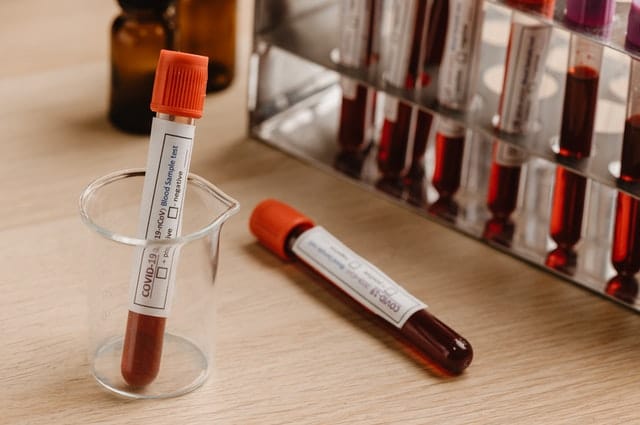A study into whether long COVID patients were more prone to Alzheimer's instead opened the door to new treatments for long COVID itself.
More than one in ten people who catch COVID don’t fully recover — developing a chronic condition called long COVID which causes a variety of debilitating symptoms, including brain fog. Since some studies have found that COVID infections are associated with overall brain shrinkage, altered brain structure, and an increased risk of developing Alzheimer’s, researchers have been investigating the links between COVID and Alzheimer’s.
“There was a lot of discussion about whether COVID or even long COVID would lead to a sudden onset form of Alzheimer’s disease so we set out to determine whether that was the case,” Dr. William Hu, director at the Center for Healthy Aging Research at Rutgers University told Being Patient.
Hu’s new study, published in Cell Reports Medicine, analyzed the cerebrospinal fluid and immune cells of long COVID patients with brain fog. Rather than finding the telltale signs of Alzheimer’s, he discovered study participants’ immune systems were still trying to fight off the COVID infection, which occurred about nine months prior. The patients whose immune cells mounted an antiviral response started to feel better — opening the door to new potential treatments for long COVID that boost the body’s antiviral response.
What the study found
The researchers looked at a group of participants from COVID recovery clinics, comparing 100 without any cognitive complaints, 79 who had abnormal results on a cognitive assessment indicating cognitive impairment, and 57 who complained about cognitive issues even though they scored normally on a cognitive test.
Hu and his colleagues took cerebrospinal fluid and blood from both groups of people with cognitive complaints to measure protein biomarkers and look at what genes the immune cells are turning on or off to see whether there was an overlap with Alzheimer’s disease. “We did not find significant numbers of people with Alzheimer’s disease markers in the cerebrospinal fluid,” Hu said. “The many molecular pathways being active in long COVID do not correspond to Alzheimer’s disease.”
But nine months after the initial infection, what the researchers did notice was that the immune cells behaved as if they were still fighting off a viral infection. About 50 percent of the cognitively impaired participants showed slow improvement after two years. The participants whose immune cells mounted an interferon response — a pathway used by the immune system to fight viruses — showed cognitive improvement.
“One of the key findings is that we see the immune cells in the cerebrospinal fluid, recruiting cells to fight infection,” Hu said. “So that tells me that the infection is in the brain.”
One limitation of the study is that it may not capture the experience of people with more severe long COVID impairments — since long COVID leads to extreme fatigue, some might not be able to participate in these studies.
Long COVID and Alzheimer’s
This study suggests that the mechanisms of long COVID and Alzheimer’s disease are distinct. COVID-19 doesn’t seem to increase the levels of Alzheimer’s biomarkers.
“I think we can convincingly say right now that COVID does not cause acute Alzheimer’s disease,” Hu said. “Now whether it increases the risk for future Alzheimer’s disease is an open question.”
According to Hu, “there are many people walking around their 60s and 70s, with [asymptomatic] Alzheimer’s disease,” which means they have amyloid and tau in the brain but no symptoms. “A systemic illness [like COVID] can accelerate the manifestation of what previously was asymptomatic Alzheimer’s disease,” he said.
Although COVID-19 doesn’t directly cause Alzheimer’s disease, like other viral infections it may increase the risk of developing symptoms. This may explain why vaccines against the flu and other viral illnesses decrease the risk of developing Alzheimer’s disease.
Interferon and antiviral drugs for treating long COVID
There are currently no treatments available for long COVID. While the National Institutes of Health has poured more than $1 billion into testing new treatments, the program has been criticized by scientific experts and patients as many of these studies are testing treatments like “exercise” and “cognitive behavioral therapy” which they say are ineffective and potentially harmful ((The National Institutes of Health’s long COVID initiative RECOVER revised its exercise and exertion trials to reduce the risk of harm to participants.)
Hu said that patients should contact their elected representatives, senators, and congresspeople to ask them to accelerate new trials focused on developing antiviral therapies that might move the needle.
“Based on our data, it looks like a successful mounting of interferon-related pathways was associated with faster recovery,” he said. “Interferon itself can be tried and there are multiple forms of the drug.”
Interferon is already approved for treating multiple sclerosis, hepatitis C, non-Hodgkin’s lymphoma, and other autoimmune diseases. Interferon is also available in subcutaneous forms, which means that getting the drug wouldn’t require traveling to an infusion center for treatment.
How to prevent long COVID
It is estimated that more than 400 million people worldwide have Long COVID. As COVID-19 has not gone away, more people will continue developing the condition.
During the early phases of the pandemic, at least 10 percent of people infected by SARS-CoV-2 developed long COVID. Now, researchers calculate the risk of long COVID has declined to around three to four percent in vaccinated individuals but remains at 10 percent in unvaccinated individuals. Rates of long COVID are higher in women, as well as Black and Hispanic individuals.
While COVID-19 vaccines may prevent severe illness and death, but Hu said that these large studies suggest that vaccines do not prevent long COVID in particular because of the way that long COVID is measured in the studies.
“What prevents long COVID is not catching COVID,” said Hu. Experts suggest using multiple layers of protection to reduce the chances of catching COVID-19. “Two things that have consistently worked is good air ventilation, and masking,” Hu said. “They’ve consistently shown to be effective in preventing infection.”
High-quality surgical masks and respirators effectively reduce the transmission of airborne diseases like COVID-19 and can also protect your lungs and brain during wildfire season. Ensuring proper air ventilation by opening windows, using HEPA filters, and improving airflow with fans makes it harder for infectious particles or pollutants to linger in the air.
If you test positive for COVID, some drugs might reduce the risk of developing long COVID. The antiviral drug Paxlovid is commonly prescribed to people who catch COVID-19 because it reduces the risk of hospitalization, and some but not all studies suggest it can reduce the risk of long COVID. The diabetes drug metformin can be prescribed off-label as some studies suggest it can reduce the risk as well.
How to diagnose long COVID
Since there are no laboratory tests that detect long COVID, the diagnosis relies on taking a patient history and excluding other potential factors that could cause symptoms. A few years ago, doctors tried antibody tests to confirm that patients with symptoms had a previous COVID-19 infection. But, that didn’t turn out to be a very fruitful approach because roughly one-third of people never develop antibodies against COVID.
To rule out other conditions, doctors might run blood tests, for example, to rule out vitamin deficiencies, hormone imbalances, or other diseases that cause similar cognitive and physical symptoms.
Unfortunately, there is still a substantial stigma surrounding long COVID. Many patients have had experiences with doctors who don’t believe the condition is real and tell patients that symptoms are all in their heads.
The Long COVID Alliance patient advocacy group has compiled a list of COVID-competent practitioners in the U.S. that can help you find the right doctor. Many hospitals also have specific clinics tailored to long COVID — which may make it easier to get a definitive diagnosis.
Long COVID Q&A with Rutgers Institute of Health neurologist Dr. William T. Hu
Rutgers’ Dr. William T. Hu focuses his research on biomarkers related to Alzheimer’s disease, frontotemporal dementia, and long COVID. He has led several pioneering studies on the prevalence of neurodegenerative diseases in Asian and Pacific American populations. Read a few questions — excerpted from our full Brain Talks Q&A with Hu — below.
-
How do viruses like COVID-19 enter the brain?
Dr. William T. Hu: When [COVID-19] first hit back in 2020, I jumped into service, as [did] many of my colleagues. We started seeing people who had seizures and strokes and other forms of brain diseases that we eventually [grouped] under encephalitis. Then at the time, we asked the question, “Does the SARS-CoV-2 virus enter the brain?”
If it did, it was very, very hard to detect using available technology. What we’re able to see, and what others have reported, is that the virus is seen in the blood vessels in the brain. They likely enter the brain in small amounts and hide out in the brain cells or the inflammatory cells.
But just by using conventional techniques like RT PCR, we have a hard time seeing it. RT PCR [is the] PCR test that we initially used. It’s not to say it’s not there; it’s just that our available technology cannot confirm it.
[Beyond COVID-19], each virus will use different receptors, which are kind of like the little seats that the virus is right on, to get into a cell. Viruses need to get into our cells to replicate and to survive in a way. How they get in often determines where in the body they will go.
If the brain cells have these receptors, then the viruses are getting in. If the blood vessel wall cells have these receptors, then the virus can get into those cells. Of course, sometimes, there’s what we call a “broad leakage.” You’re very sick, and you’re not getting enough oxygen, your body is trying to save yourself, and this sacred barrier between the blood and the brain opens up. Then, a lot of things can get in. Once you get better, it may be very hard for things to get out.
-
Why do people with long COVID have lingering symptoms like brain fog or exhaustion?
Hu: We don’t quite know what causes the symptoms. From a clinical and scientific perspective, it’s very hard to draw a line between what we see in the laboratory [and] what people feel. Then again, we kind of use the association type of test: [For example] if we see something [and] you feel something, [and then] we see that thing get better [and] you get better. Then whatever we saw earlier was probably causing — or at least related to — what you were feeling.
If we’re going to use that approach, then I think a lot of what our study showed is that people were feeling these brain fog symptoms because there was a lot of inflammatory change going on in the brain that was detectable in the spinal fluid.
-
What have we learned about COVID-19 in the past four years in terms of whether it contributes to Alzheimer’s risk?
Hu: There are three ways to answer that question. Number one is: does acute [COVID-19] lead to acute Alzheimer’s-type changes? There were some early studies in the blood that seemed to suggest that, which led us to really ask the question: can we go deeper? Can we use more accurate markers to see if long COVID can be explained in some way by the Alzheimer’s marker changes? The answer is no. I think it was a fairly convincing “No” that we no longer believe that [COVID-19], either in an acute form or long COVID form, will lead to sudden Alzheimer’s type of changes— even if the symptoms of long COVID and Alzheimer’s disease can be similar to outsiders.
Number two is: In the long term, does having [COVID-19] or long COVID increase your future risk for Alzheimer’s disease? That we don’t know yet. That is something that we continue to follow some people over time who’ve experienced long COVID — some of whom have gotten better, others have not — to see whether there’s a difference in future risk for Alzheimer’s disease. The answer to that question probably won’t be apparent for another five to 10 years.
Then there’s a final group of people who are very interesting to us: They’re the people who already have some brain changes of Alzheimer’s disease that, without [COVID], likely wouldn’t have been symptomatic yet. They will be what’s called the asymptomatic or pre-symptomatic Alzheimer’s disease stage. Then, because of [COVID-19], or even sometimes because of other infections and hospitalizations, their brain disease starts to manifest outwardly. We think that studying this group of people may help us address some of the answers in the meantime as to whether long COVID or [COVID-19] causes a future increase in Alzheimer’s disease risks.
Watch the full interview here.
UPDATE January 19th, 2025 – Added new statistics about the prevalence of long COVID.




